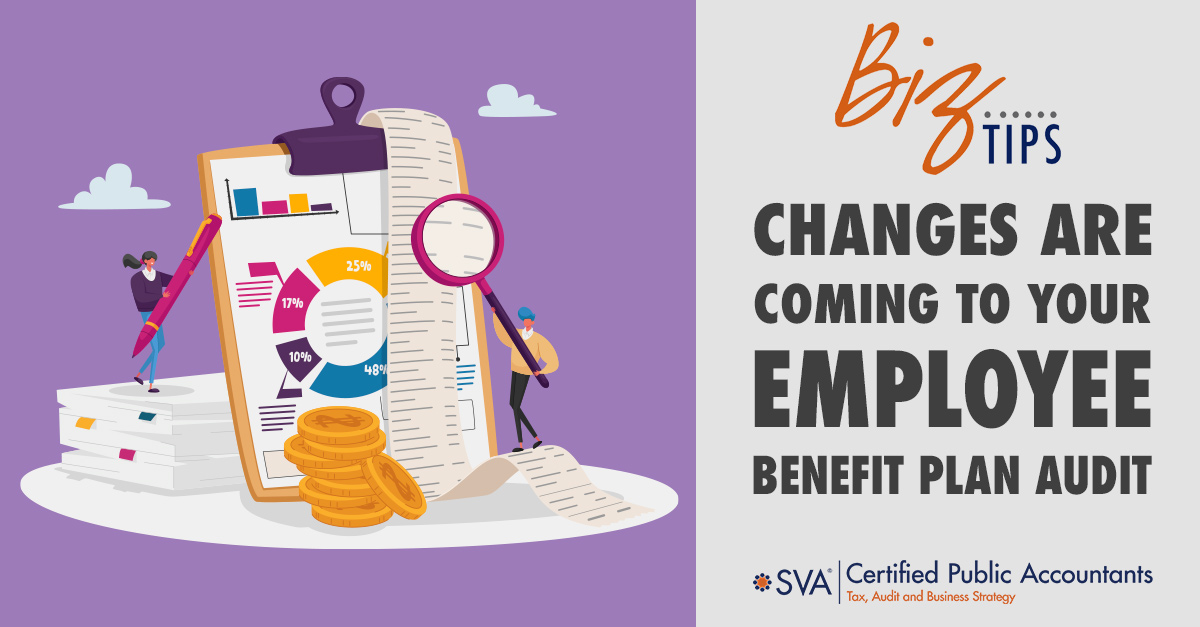When?
Beginning with either the 2020 or 2021 plan year financial statements (plan audits performed in 2021 or 2022), your auditor will be following new auditing standards to perform and report on your plan financial statement audit.
Why?
The Auditing Standards Board of the American Institute of Certified Public Accountants (AICPA) establishes U.S. auditing standards (generally accepted auditing standards or GAAS) for audits of financial statements of private companies, nonprofit organizations, and federal, state, and local governments (non-issuers). The AICPA issued Statement on Auditing Standards (SAS) No. 136, Forming an Opinion and Reporting on Financial Statements of Employee Benefit Plans Subject to ERISA (SAS No. 136, as amended), for auditors who perform audits of financial statements of employee benefit plans subject to the Employee Retirement Income Security Act of 1974 (ERISA).
The new standard prescribes certain new performance requirements for ERISA plan financial statement audits and changes the form and content of the related auditor's report. SAS No. 136 is codified in AU-C section 703, Forming an Opinion and Reporting on Financial Statements of Employee Benefit Plans Subject to ERISA, in the AICPA Professional Standards. SAS No. 136, as amended, is effective for audits of ERISA plan financial statements for periods ending on or after December 15, 2021, although earlier implementation is permitted.
What's New?
The new standard includes new requirements in all phases of an audit of ERISA plan financial statements including engagement acceptance, risk assessment and response, communication with those charged with governance, performance procedures, and reporting.
The standard establishes new performance and reporting requirements specific to ERISA Section 103(a)(3)(C) audits. The ERISA Section 103(a)(3)(C) audit is unique to employee benefit plans and is not considered a scope limitation. Accordingly, an audit performed pursuant to ERISA Section 103(a)(3)(C) will no longer be referred to as a "limited scope audit" but rather, going forward, will be referred to as an "ERISA Section 103(a)(3)(C) audit."
Do Any of the Changes Affect Plan Management (Sponsor/Administrator)?
As part of the auditor’s acceptance of the audit engagement, the auditor will request plan management (sponsor/administrator) to acknowledge in the engagement letter management's responsibilities for maintaining a current plan instrument, administering the plan, and providing the auditor with a substantially complete draft Form 5500 prior to the dating of the auditor's report. In addition, the new standard requires that the auditor obtain certain written management representations at the conclusion of the engagement regarding those responsibilities.
It also includes new acknowledgments related to management's responsibilities when management elects to have an ERISA Section 103(a)(3)(C) audit, including determining whether such an audit is permissible, the investment information is prepared and certified by a qualified institution, the certification meets DOL requirements, and the certified investment information is appropriately measured, presented, and disclosed in accordance with the applicable financial reporting framework.
In addition, your auditor may request additional information from you in order to perform the plan audit under the new standard, which may result in the need for you to spend more time preparing for your plan audit this year.
How Can I Learn More About the New Audit Standard?
You will want to discuss with your plan auditor how the new audit standard will affect your plan audit.
Download AICPA’s New Audit Standard for employee benefit plans:
An Overview for Plan Management

© 2021 Association of International Certified Public Accountants

